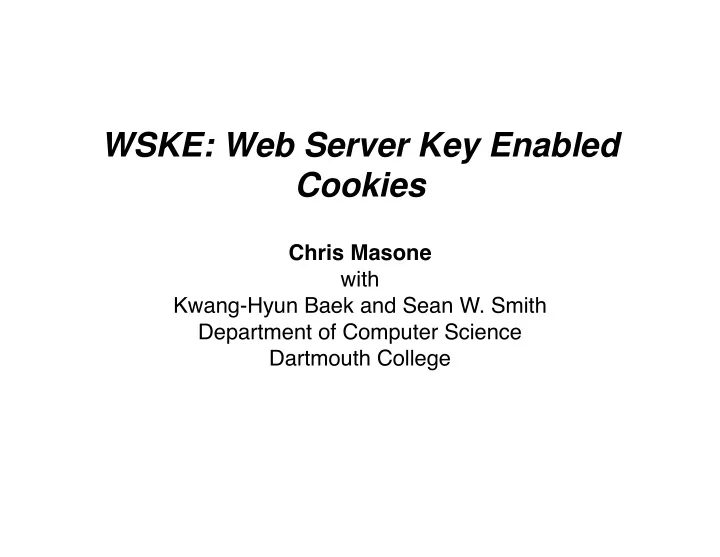

WSKE: Web Server Key Enabled Cookies Chris Masone with Kwang-Hyun Baek and Sean W. Smith Department of Computer Science Dartmouth College
Outline • Motivation • WSKE • Design • Implementation • Evaluation • Related work • Conclusions
Motivation • Web app designers want to improve � Authentication usability � Phishing resistance • One strategy: secure cookies � Disclosure resistant � "Same origin policy" � Set, released only over SSL/TLS � Usually encrypted w/site specific secret
Secure Cookie Issues • Subject to replay attacks • Cross-Site Scripting (XSS) � can be prevented by proper site construction � addressed in other work • Pharming � Attacker can spoof DNS • IP attacks (BGP) � Attackers can cause re-routing of IP traffic � Yes, this is seen in the wild
Secure Cookie Issues • Subject to replay attacks • Cross-Site Scripting (XSS) � can be prevented by proper site construction � addressed in other work • Pharming � Attacker can spoof DNS • IP attacks (BGP) � Attackers can cause re-routing of IP traffic � Yes, this is seen in the wild ...Cookies are in use, we should protect them!
Server-Side SSL • SHOULD protect against DNS, IP spoofing • A myriad of dialog boxes � mismatched domain name � unknown issuer for server certificate � makes secure cookies less usable for authentication • Users trained to click through • If warning, then no cookies � ~60% of SSL servers misconfigured � Sites cannot choose to go self-signed � Ideal solution avoids "breaking the web"
Properties of a Solution • Leverage crypto • Users shouldn't need to understand • Limit impact on deployed sites • Avoid server-side config changes • Minimize user-side requirements
WSKE After cookies set via SSL, WSKE binds them to server of origin and server's public key • No user interaction • Web apps don't need to change • Misconfigured SSL OK • Covers a network-based attacker • Key expiration potentially an issue
WSKE: Note... • WSKE does not address registration • Registration hard, addressed elsewhere • WSKE simple, deployable now � Users careful about SSL signals once, then protected � Same trust model as SSH � Combine with more complex registration method
Prototype Design • Man-in-the-middle at client • When cookies are set: � Remember hostname � Remember server's SSL key fingerprint � Bind cookie to these values • Just before cookie release: � Verify hostname (browsers do this already) � Check current SSL key against stored fingerprint � Release cookies only if key matches
Prototype Implementation • Firefox extension Https Requests Https Requests Internet Https Responses Https Responses Local Hostname/ Fingerprint Store • JavaScript cookie access left for future work
Prototype Implementation Browser Server Http request ready SSL handshake initiation Response, with server certificate Ideal window for checking SSL setup continues server key . . . SSL session established Request sent (with cookies)
Prototype Implementation Browser Server Http request constructed http-on-modify-request Http request complete SSL handshake initiation Response, with server cert BadCertHandler SSL setup continues No hooks here . . . SSL session established Request sent (with cookies) Response returns http-on-examine-response
Prototype Implementation Browser WSKE Server Http request constructed http-on-modify-request No cookies. Request returned unmodified. Http request ready SSL Negotiation Request sent Response returns (with cookies) http-on-examine-response If cookies, then store hostname and key hash Return response unmodified
Prototype Implementation Browser WSKE Server Http request constructed http-on-modify-request Dummy request constructed SSL negotiation Cookie-less dummy req. Response (ignored) Server key check Request returned. No cookies if key mismatch Http request ready SSL negotiation Request sent Response returns
Evaluation • Attack resistance � Testbed: 2 webservers, BIND, and a client � Cookies blocked in simulated DNS attack � Cookies blocked in simulated IP-spoof attack • Deployability � Web Apps need not know about WSKE � Load-balancing, new server keys could be problem � Possibly bind to CA key instead of server key • Usability � Users only need to look at SSL cues once � If spoofing, credentials cannot be released � Is there a re-registration attack?
Related Work • Locked Cookies � Contacted by authors after WSKE accepted to USEC � Same concept, implementation modifies binary � Published as a tech report • Active Cookies � Requires server-side changes, no client-side code � Binds cookies to numeric IP addresses � Vulnerable to IP-based attacks • Phone-based schemes � Phoolproof, Mannan & van Oorschot � Require an external device, server and client changes � Perhaps overkill for some sites
Conclusions • WSKE could be deployed today • Server-side SSL made more usable • Cookie-based auth made more secure • Prototype works, but could be cleaner • More rigorous usability evaluation?
Thanks! Questions?
Recommend
More recommend